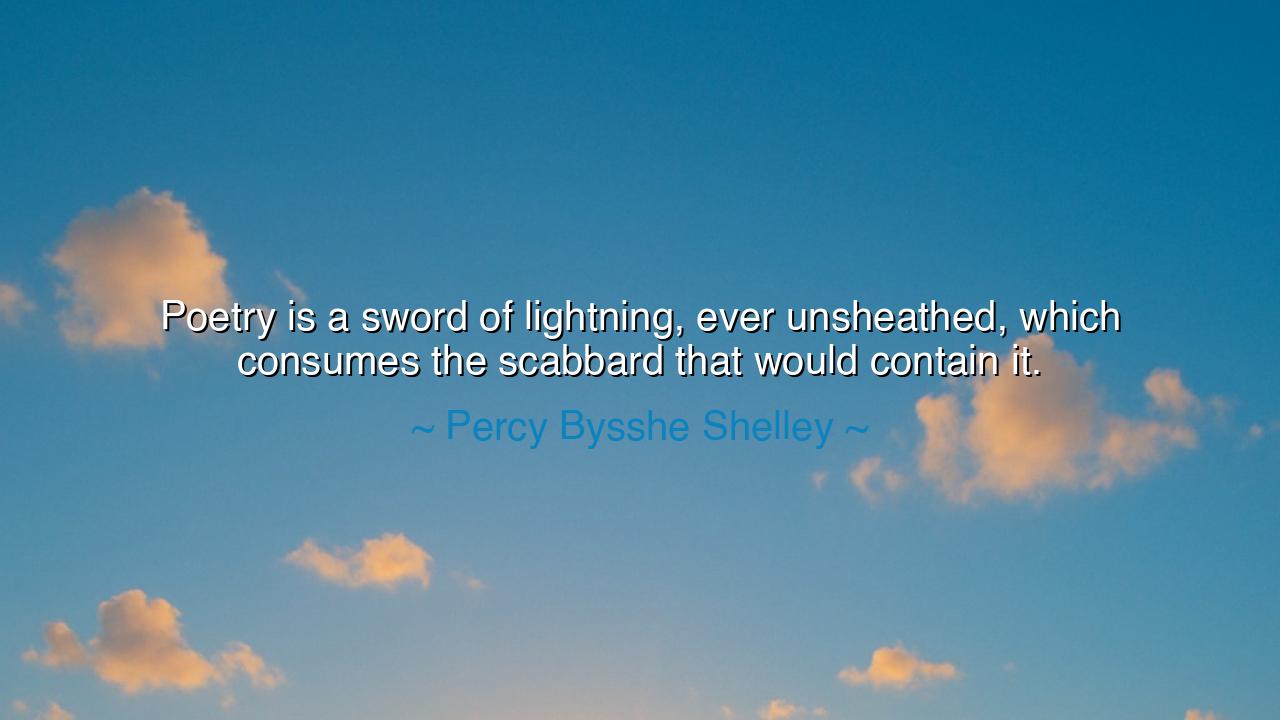
Poetry is a sword of lightning, ever unsheathed, which consumes
Poetry is a sword of lightning, ever unsheathed, which consumes the scabbard that would contain it.






Hear, O children of flame and seekers of truth, the thunderous vision of Percy Bysshe Shelley, who declared: “Poetry is a sword of lightning, ever unsheathed, which consumes the scabbard that would contain it.” In this utterance, the Romantic poet reveals both the danger and the glory of poetry. It is not a tame ornament, nor a harmless pastime—it is a force of nature, sharp as steel, radiant as fire, destructive to all that would bind or silence it. Poetry, in its essence, is freedom itself, refusing to be contained.
The image of a sword of lightning is no idle metaphor. A sword is a weapon of battle, a symbol of strength and justice. Lightning is the fire of heaven, untouchable, devastating, and dazzling. Joined together, they suggest that poetry is both weapon and miracle: a blade that strikes not in silence, but in thunder and brilliance. Poetry wounds falsehood, cuts through tyranny, and illuminates the dark places of the human soul. It is not neutral—it takes sides, it fights, it blazes.
But Shelley goes further: he declares that poetry is “ever unsheathed,” meaning it can never be put away. Unlike a common weapon that can rest in its case, poetry is always alive, always active, always striking. Even when ignored, it burns beneath the surface. Even when censored, it finds new forms. Even when a people tries to bury it, it will rise again, for the scabbard cannot contain it. The scabbard, the sheath, represents all attempts to restrain or silence poetry: governments that censor, critics who belittle, societies that grow indifferent. But poetry consumes these bonds, for it is greater than them all.
History confirms this vision. Consider the words of Pablo Neruda in Chile, whose poetry of love and resistance outlived dictatorships. Or the verses of Anna Akhmatova in Russia, whispered from memory when her work was banned, surviving in the minds of her people when the scabbard of censorship tried to erase her. Or even Shelley himself, who wrote with a voice so fiery that though many of his works were attacked in his own day, they endure centuries later, striking with the same lightning. The sword of poetry cannot be contained—it consumes its very sheath.
And yet, poetry’s power is not only in destruction but in creation. Like lightning, it shatters but also illuminates. It shows us visions of beauty, of love, of freedom, of the possible future. This is why rulers have feared poets, why prophets have spoken in verse, why revolutions have been carried on the wings of song. For poetry not only destroys lies—it plants new truths in their place. It strikes, but it also shines.
Shelley himself lived in an age of revolution, where the old world was crumbling and the new was yet to be born. His words carry the fire of a man who believed in the transforming power of art, not as decoration but as force. His “sword of lightning” is not metaphor alone; it is a call to recognize poetry as an active, dangerous, liberating energy, one that demands courage from both poet and reader.
Therefore, O seekers, the lesson is this: treat poetry not as a delicate flower, but as a living flame. Do not expect it to be safe, to be comfortable, to be easily contained. Let it cut you, let it burn you, let it awaken you. And if you write, write not timidly, but with the knowledge that your words may strike like lightning—unpredictable, unstoppable, unforgettable.
So remember Shelley’s wisdom: poetry is a sword of lightning, ever unsheathed. It will consume any scabbard that dares to restrain it. And if you dare to wield it, do so with reverence and courage, knowing that it has the power to shape not only hearts, but nations. For poetry is not silence—it is storm.






AAdministratorAdministrator
Welcome, honored guests. Please leave a comment, we will respond soon